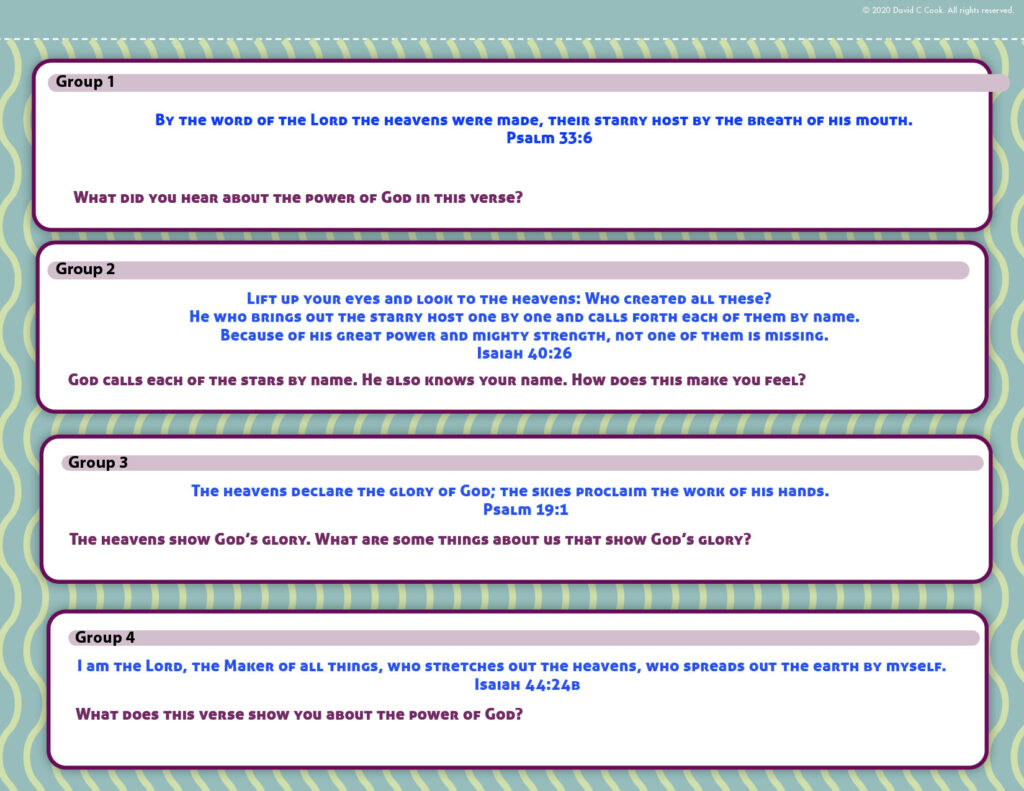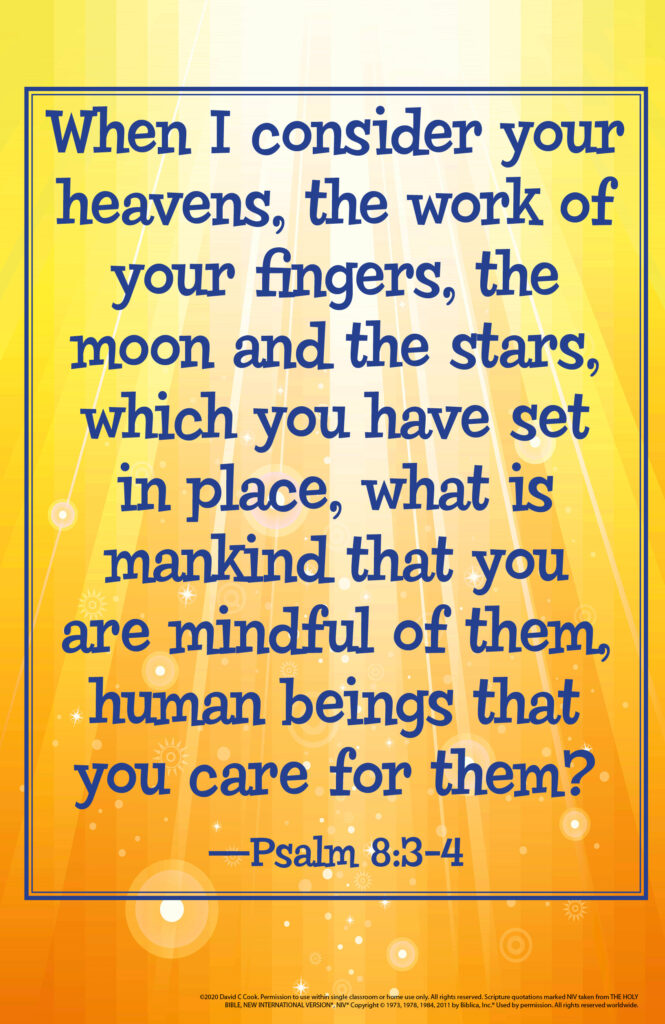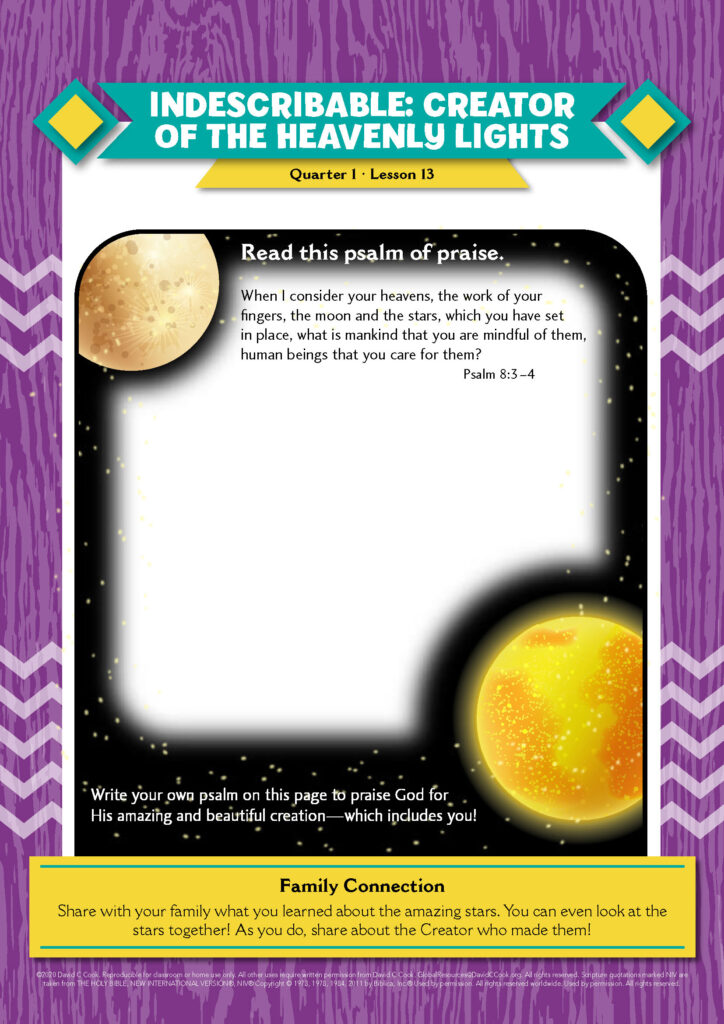During the lesson, the information for you to know is written in regular type, and what we suggest speaking or reading aloud to children is in bold. All resources for this lesson, including the Teacher Guide, Student Page, Family Connection Card, and other resources can be downloaded in a ZIP file by clicking on the following link:
In some lessons you will find "resource articles." These are articles written by experts from around the world to help equip you for your work with children and adolescents. Share them with parents or guardians if you consider it appropriate.
When I consider your heavens, the work of your fingers, the moon and the stars, which you have set in place, what is mankind that you are mindful of them, human beings that you care for them?
Psalm 8:3–4
King David, who wrote this psalm, did not know nearly as much about the stars, the galaxies, and the universe as we know today. Yet when he looked at the night sky, he was aware of his smallness in comparison to the universe. He recognized God’s bigness. How could a God who created the vast universe filled with billions of stars and a perfectly-placed sun and moon care for humans, who are here for a short time and vanish like mist? (James 4:14).
Beyond imagination, our big, indescribable God not only sees us, but He loves us. This God who created the universe invites us to know Him and be His friend through His Son, Jesus. When we realize that, worship is our natural response.
As you share facts about stars that amaze the mind, encourage your students to marvel at what God has created. Recognizing that our God is truly indescribable leads us to a place of humility, worship, and gratefulness. Take a few minutes right now to praise God for His amazing creation and especially for His love and care for you and your students.
Encourage the students to share with their families what they have learned about the amazing stars. They can invite their family members to look at the stars with them. Then they can share about the Creator who made them.
Teacher Tip: If possible, email or text the Family Connection Card to the families of your students.
Optional: Give each student a piece of paper and a pencil or markers. If you do not have these supplies, you can have a discussion and write down ideas on a whiteboard or share them verbally.
End of Option
What is the most amazing thing you have ever seen? Maybe it was an animal or something in God’s creation. Perhaps it was an event you witnessed. Take a few minutes now to describe what you have seen.
Have your students get into pairs. Give them a few minutes to think about their answers and share with their partners. Share your own story of the most amazing thing you have ever seen. If possible, talk about a time when you saw stars or a bright, beautiful moon.
Stars are 1 amazing thing most of us have the opportunity to see many times during our lives. Have you ever thought about how many stars there are in the sky? Today, we will talk about the stars and learn about the moon and sun. This information comes from 2 men who love the stars. One man is Matt Redman, a songwriter and book author from England. The other man is a pastor and book author, Louie Giglio. He loves astronomy.
It is the study of the stars.
You may not think about the stars very often. Some people do not pay attention to them. Maybe they live in big cities where the lights or pollution block out the stars. Maybe they just take the stars for granted so much that they never think about them or allow themselves to be amazed by them.
Today you will hear some amazing things about the stars—as well as the sun and the moon. As I share, remember our God made these heavenly lights. Let’s hear about the day God created stars!
Have a student read Genesis 1:14–19 aloud from the Bible.
And God said, “Let there be lights in the vault of the sky to separate the day from the night, and let them serve as signs to mark sacred times, and days and years, and let them be lights in the vault of the sky to give light on the earth.” And it was so. God made two great lights—the greater light to govern the day and the lesser light to govern the night. He also made the stars. God set them in the vault of the sky to give light on the earth, to govern the day and the night, and to separate light from darkness. And God saw that it was good. And there was evening, and there was morning—the fourth day.
Genesis 1:14–19
Sun, moon, and stars.
Answers may include: serve as signs to mark sacred times and days and years, give light to the earth, govern the day and the night, separate light from darkness.
Students may mention things such as navigation, solar energy, the calendar, or the wise men who followed the star to find Jesus.
Allow students to share their thoughts.
Optional: If you are using The NIV Action Study Bible, allow students to see an illustration of the stars God created after page 22.
God created the heavens and the stars for His glory. He intended for us to see them as a sign of His power and to be in awe of His amazing creation. He did not intend for us to worship them or to use them for spiritual purposes. When we do, we are dishonoring Him and His creation.
Right now, we are going to hear some facts about the sun, moon, and stars. You may have heard this information before, but these truths are a good reminder of our amazing Creator.
Fact 1
The sun and the moon look the same size in our sky. But the sun is 400 times larger than the moon, and it is 400 times farther away. The moon is the perfect size. If it were larger, it would cause Earth to tilt too much. This would make 1 side of Earth unbearably hot, and the other side would always be very cold! Because the moon is just the right size, we have seasons, and the weather is not too hot or too cold for people to live. God’s creation is perfect and amazing!
Fact 2
Just a few hundred years ago, people who studied the stars believed there were only about 6,000 stars in the whole universe. They were very, very wrong. Astronomers now believe that there are more stars in the universe than there are grains of sand on all the world’s beaches and deserts. Today, astronomers believe there are between 100 and 200 billion galaxies in the universe. A galaxy is an enormous group of stars, planets, gas, and dust. Each of these galaxies contains hundreds of billions of stars. God, our Creator, made every star, and He knows them all by name!
Fact 3
Stars look small, but most of them are massive. One huge star is called IRS 65. If our sun were only the size of my 2 hands as I made a ball by touching my fingertips and my wrists, to make a circle, IRS 65 would be as tall as Mount Everest, the world’s highest mountain. The God whose creation is bigger than we can ever imagine has a plan for every amazing thing He created—including you!
Students might have fun with this question. Encourage them to use their imaginations. Maybe He wanted to look at them. Maybe He has a plan we could never understand. Maybe He wanted scientists to discover a little at time and with every discovery realize what an amazing Creator He is.
Fact 4
Light from the sun and stars travels very fast. Light is so fast that it can circle the earth 7 times in only 1 second. It travels at the amazing speed of 299,792 kilometers every second! Think of this: the God who created time and space loves you to the ends of the universe!
Fact 5
Stars die. They are made up mostly of hydrogen gas. They generate energy and release radiation. This gives stars energy to shine for billions of years. But eventually, they use up their energy. When a star dies, spectacular things happen. For example, 1 star called Supernova 1987A died. For a few months at the end of that star’s life, it burned over 100 million times brighter than our sun. You can be friends with the God who breathed out the stars, the God whose power knows no end.
Fact 6
We all know that stars shine, but did you know they also sing? Large radio telescopes aimed at the stars pick up the individual sounds the stars make. For example, a star called Vela sends out a nonstop rhythmic, staccato beat. Other stars hum and sound like violins playing in different octaves. When God created the stars, He also created His own string orchestra—and His creations are playing a beautiful song!
Let’s listen to what David wrote in the Bible about the stars, sun, and moon:
Praise him, sun and moon; praise him, all you shining stars.
Psalm 148:3
Think about this—God made each of the many stars in the universe. Stars do not think. They cannot decide if they want to follow God or not. Only humans, of all of God’s creation, can make the choice to love Him. He values us above everything else He made—because we can have a relationship with Him and be His friends. If the stars praise God, how much more can we, who are called His children, worship Him? The beautiful truth is this: God, who created the stars and named them 1 by 1, knows each of us by name, too.
Divide the students into 4 groups. Assign each group 1 verse. The group will come up with a creative way to read their verse. They may read it dramatically, act it out, add motions, read it as a group, or present it in any other dramatic way. If possible have them read their verse directly from the Bible. If that is not possible, use the verses written below. They are also printed on cards at the end of the lesson. After each group gives its presentation, ask 2–3 students to answer the question that follows each verse.

Many verses about the stars use poetic language. In your groups, create a poetic way to read the verse for the whole class. You may want to add motions or divide the verse into sections to be read by different people. Be creative!
Group 1
By the word of the Lord the heavens were made, their starry host by the breath of his mouth.
Psalm 33:6
Group 2
Lift up your eyes and look to the heavens: Who created all these? He who brings out the starry host one by one and calls forth each of them by name. Because of his great power and mighty strength, not one of them is missing.
Isaiah 40:26
Group 3
The heavens declare the glory of God; the skies proclaim the work of his hands.
Psalm 19:1
Group 4
I am the Lord, the Maker of all things, who stretches out the heavens, who spreads out the earth by myself.
Isaiah 44:24b
After the groups have had an opportunity to share their thoughts about their verses, bring the class together to reflect on 1 final verse.
Although God created everything we can see—and even the things we cannot see—He has only given to humans the freedom to decide if they will love Him. Stars do not have this choice. When people choose to love God, they receive His amazing gift of salvation through Jesus—which is even more awe-inspiring than the beauty of the universe.
I praise you because I am fearfully and wonderfully made; your works are wonderful, I know that full well.
Psalm 139:14
If you want to praise God for how He made you, please stand up, 1 at a time, and praise Him. Praise Him with 1 sentence, and then sit and let someone else pray.
Model this activity for the students by going first. For example, you might pray, “I praise You, Father God, because You created me so I could know You.”
Today we have learned a lot of amazing facts about the stars that God created. His amazing creations show us that He is worthy of our praise! One of the ways God is praised in the Bible is through psalms. The word “psalm” comes from a Hebrew word meaning song. As we consider the beauty of the universe, we will write psalms to praise Him for all that He has fearfully and wonderfully made. Listen as I read you a psalm that shares how God feels about you.
When I consider your heavens, the work of your fingers, the moon and the stars, which you have set in place, what is mankind that you are mindful of them, human beings that you care for them? You have made them a little lower than the angels and crowned them with glory and honor. You made them rulers over the works of your hands; you put everything under their feet:
Psalm 8:3–6

He wonders how God can notice him with such a vast, amazing universe full of planets, moons, and stars.
He made them glorious and gave them honor. He made humans the rulers over the rest of His creation.
The power and vastness of the stars is hard to imagine. But think about this: our God, who made them and holds them in place, loves us. He created and knows each one of us and considers us to be far more special than stars. Life is hard sometimes. We may be hungry, hurt, or abused. We may experience conflicts with friends or family. But when we trust in God, we know that He will help us to face the challenges and praise Him even in the hardest of difficulties. He knows our names, just like He knows the name of every star. We are not alone. He holds everything
together—and that includes our lives. Our God, who holds the entire universe together, holds our lives in His loving and powerful hands.
Now we will each create a psalm to praise God for His majesty, His power, and His love. You may share your psalm with others, if you like—or you may share it only with God.
Give the students a few minutes to create their own psalms. Let the students know that their praise songs to God can be simple—just a few lines. He knows what is in their hearts. They can tap out a rhythm for what they want to say to help them remember it. Or they can hum it quietly to themselves. Give them about 5 minutes to create their psalms. If any students are interested in sharing what they created, allow a few to do so.
Optional: If you are using the optional supplies, the students can write their psalms on pieces of paper and decorate them with markers or colored pencils.
If you are using the Student Pages, the students may record their psalms on these pages.
End of Option

Tonight, look up at the sky and remember that the God who lights up the darkness with beautiful stars loves you more than you can imagine. His love for you is greater than the universe.
Optional: If your class is held at a time and in a place where students can safely view the stars, ask the students to sit outside. Instruct them to look at the stars as you read Psalm 8:3–6. While they view the heavens, discuss God’s love and care for them.
End of Option
Close your time with a blessing over your students based on Philippians 2:15.
Blessing: May you know the deep love our God has for you. He created each star and yet knows you by name. May you glorify Him as you shine like stars in the sky.
If you have time, continue to share this song with your students to celebrate how great God is!
Life on Life ©2020 David C Cook. Reproducible for home or classroom use only. All other uses require written permission from David C Cook [email protected]. All rights reserved.